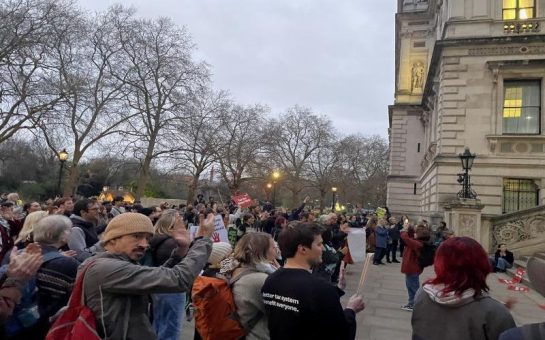October saw the first International parkrun Day.

Hmpttthh, Hrggghhh – gasp in, pant out. Legs feeling like dead weights, chest constricting in on itself, vision blurry.
It’s 9.20 am on Saturday morning and I am attempting (struggling might be the better word) to ascend the steep slope leading to the centre of Finsbury Park in North London.
Why am I putting my body through such unnecessary rigour at a time when the majority of my friends and family are enjoying their well-earned Saturday lie-in?
I’m participating in parkrun, a free, weekly, 5k timed event that is more than likely taking place in a park or green space near you.
For those of you who aren’t yet aware, parkrun is the brainchild of Paul Sinton-Hewitt and was founded in 2004 (with just 13 runners taking part in Bushy Park, Teddington).
From it’s South-West London roots, parkrun has grown through word of mouth and, after initially expanding to other parks throughout London, soon became a UK wide sensation.
The growth of the runs has been so successful in recent years that October saw the first ever International parkrun Day, celebrating the event’s now global span.
Tom Williams is parkrun’s UK Country Manager and has helped develop the runs throughout Britain after initially starting the Leeds parkrun in 2007.
He began his present, full-time role in January of this year and spends much of his working week travelling the country meeting local teams and supporting the set-up of new events.
Williams tells me that parkrun’s growth has not been plotted via some grand master-plan and is in no way target driven, but is based around a simple ethos.
“Paul’s vision has always been for there to be a parkrun everywhere in the world where somebody wants one,” he explains.
“We’re simply responding to the demand of people wanting them, so we don’t really actively look to put parkruns anywhere, we wait for people to say ‘I’d like one in my local community’ and then we help them make it happen.”
The Finsbury parkrun that I forced myself round is a good example of a run developing organically in response to local demand.
The event’s director Stuart Moakes arrived in North London in 2009 and was going through a “fitness phase” at the time.
Having heard of the parkrun phenomenon, he was slightly disappointed to find that the nearest run to him was all the way down in Wimbledon (over an hour’s journey).
“I’m not the best at getting up on Saturday morning so I wanted to see what we could do locally,” he says.
“I was exploring runs and stumbled upon Finsbury Park and thought ‘this would be great’ which is why I sent the email (to parkrun) in the first place.”
Setting up a run seems to be a relatively simple process providing the desire for one exists.
The parkrun team offer assistance with all aspects of the set-up including course planning, volunteer organisation and event co-ordination.
Moakes describes how the Finsbury Park run benefited from a “captive audience of North Londoners” who were aware of parkruns in South London but, like himself, wanted something a bit closer to home.
After quickly securing a regular turnout of 60 or so people, the event has grown steadily over the years and recently broke its record attendance with 137 runners taking part.
Although instrumental in setting up and supporting the run, Moakes feels he represents the more typical, casual jogger rather than the elite athlete.
“I have, like a lot of people, a love-hate relationship with running,” he laughs.
“I run but I see myself more in the broad church of parkrunners – they’re not brilliant, they’re not going to break any records, but they like running and it’s good to have a parkrun to do it because it’s free and it gives you some motivation.”
This neatly encapsulates the ever-growing appeal of the concept and the reason it now finds itself with an international following.
At the last count there were around 180 parkruns across the globe (including one at Camp Bastion in Afghanistan) and new events are popping up all the time.
Tim Oberg runs the Australian operation and had the idea of celebrating an International parkrun Day.
Originally from Brisbane, Oberg lived in London from 2001 to 2010 where he was introduced to parkrun.
Following discussions with Sinton-Hewitt in 2010, he returned to Australia with the aim of introducing the parkrun concept ‘down under.’
Since its launch on the Gold Coast in 2011, Oberg has overseen an expansion to 11 national parkruns with plans for at least six more under way.
“I first floated the idea of International parkrun Day to Paul and Tom as I think one of parkrun’s biggest strengths now is its international dimension,” he explains.
Williams feels that that the migratory aspect of the event is fuelled by people embracing the concept and then not wanting to be without it when they move between cities or countries.
He says: “It becomes part of all our lives so the thought of not having it is something that is too hard for all of us to bear really.
“People can literally travel the world and have the same, or similar, parkrun experiences.
“I know that my Australian parkrunners find it extremely exciting to know that they are part of a global family and I’m sure many are planning to include a parkrun visit in their next trip to the UK, New Zealand, USA or South Africa.”
One of the more impressive qualities of the parkrun events is the incredible support they receive from volunteers who offer both direction and encouragement around the course as well as collecting and processing times.
On the day of my run, Michelle Griffiths, 47, is one of the volunteers aiding the participants around Finsbury Park.
After benefiting from her encouragement as I approached the finish line, I catch up with Griffiths in the café afterwards where she offers a refreshingly honest appraisal of the pros and cons of volunteering.
“I prefer to run and so I don’t enjoy volunteering as much,” she reveals.
“But it is fun and you get to see a different aspect of the race – you get to see the people at the front!
“When people cheer you, it does make you run faster.”
Although parkrun does benefit from some sponsorship, it is clear that volunteers are the lifeblood of the events and none could take place without them.
Those who participate in the runs are encouraged to volunteer when they can and Williams tells me that over 15,600 people have volunteered so far this year.
This figure alone represents the immense commitment that parkrunners have towards their events – the prospect of standing around for more than an hour on cold Saturday mornings does not, in-and-of-itself, have massive appeal.
So what does parkrun offer that keeps runners here in the UK, and increasingly those from further afield, coming back for more?
James Grunshaw, 27, is a first time runner at the Finsbury parkrun.
He tells me he is struck by the welcoming atmosphere and the benefits that come from a group run.
“If you are with a group of people it’s a good motivator to keep going as you encourage each other along,” he explains.
Moakes feels the social nature of the run is one of its most important features.
“There are two sides to parkrun for me, there is the running side but then there is also this massive community,” he says.
“You get to know people and know people’s stories and I suppose, in a sense, the stories behind their running.”
Everyone I speak to has their own reason for coming to parkrun, from volunteer Michelle who wanted to lose weight for a friend’s wedding, to Jose from Spain who has just arrived in London and wants to meet people and also keep fit.
But the magic of the events seem to be the way they create a happy balance between the competitive and the social.
“You have 13 or 14 minute 5k’ers through to people who can’t run 5k but they are all together with this common goal,” says Williams.
“I think that the popularity really comes from that – the opportunity for a regular coming together of supportive people.”
The parkrun model is a good example of the sort of pro-active organisation that David Cameron was hoping for when he talked of a ‘Big Society.’
It certainly strikes me as an idea that came around at the right time and has been developed in the right way.
“It’s nice to have that sense of community, especially in a big city like London, because I think you can lack that,” says Moakes.
“I’m happy about how the run has developed and I think it’s going to be here for a very long time.”
Moakes’ words seem prescient, in one sense parkrun is going nowhere, but at the same time it’s also setting off on a truly global adventure….
Follow us on @SW_Londoner




